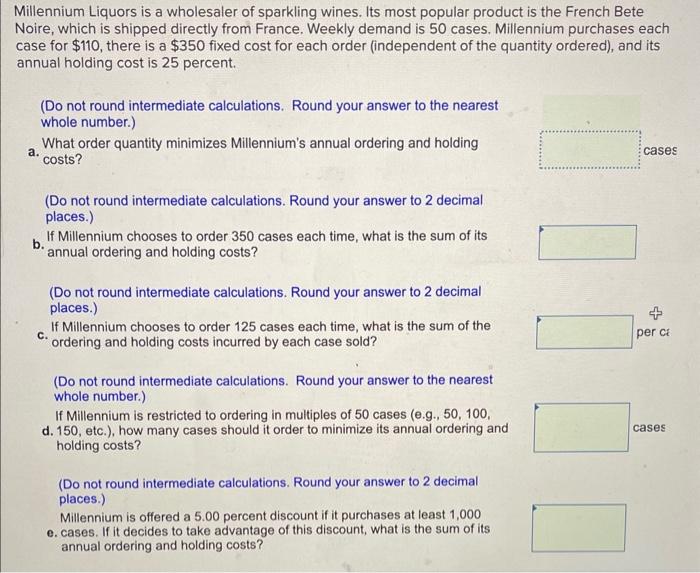Millennium Liquors is a wholesaler of sparkling wines. Its most popular product is the French Bete Noire, which is shipped directly from France. Weekly demand is 50 cases. Millennium purchases each case for $110, there is a $350 fixed cost for each order (independent of the quantity ordered), and its annual holding cost is 25 percent. (Do not round intermediate calculations. Round your answer to the nearest whole number.) a. What order quantity minimizes Millennium's annual ordering and holding a. costs? cases (Do not round intermediate calculations. Round your answer to 2 decimal places.) b. If Millennium chooses to order 350 cases each time, what is the sum of its annual ordering and holding costs? (Do not round intermediate calculations. Round your answer to 2 decimal places.) If Millennium chooses to order 125 cases each time, what is the sum of the c. ordering and holding costs incurred by each case sold? (Do not round intermediate calculations. Round your answer to the nearest whole number.) If Millennium is restricted to ordering in multiples of 50 cases (e.g., 50, 100 , d. 150, etc.), how many cases should it order to minimize its annual ordering and holding costs? (Do not round intermediate calculations. Round your answer to 2 decimal places.) Millennium is offered a 5.00 percent discount if it purchases at least 1,000 e. cases. If it decides to take advantage of this discount, what is the sum of its annual ordering and holding costs? Millennium Liquors is a wholesaler of sparkling wines. Its most popular product is the French Bete Noire, which is shipped directly from France. Weekly demand is 50 cases. Millennium purchases each case for $110, there is a $350 fixed cost for each order (independent of the quantity ordered), and its annual holding cost is 25 percent. (Do not round intermediate calculations. Round your answer to the nearest whole number.) a. What order quantity minimizes Millennium's annual ordering and holding a. costs? cases (Do not round intermediate calculations. Round your answer to 2 decimal places.) b. If Millennium chooses to order 350 cases each time, what is the sum of its annual ordering and holding costs? (Do not round intermediate calculations. Round your answer to 2 decimal places.) If Millennium chooses to order 125 cases each time, what is the sum of the c. ordering and holding costs incurred by each case sold? (Do not round intermediate calculations. Round your answer to the nearest whole number.) If Millennium is restricted to ordering in multiples of 50 cases (e.g., 50, 100 , d. 150, etc.), how many cases should it order to minimize its annual ordering and holding costs? (Do not round intermediate calculations. Round your answer to 2 decimal places.) Millennium is offered a 5.00 percent discount if it purchases at least 1,000 e. cases. If it decides to take advantage of this discount, what is the sum of its annual ordering and holding costs







